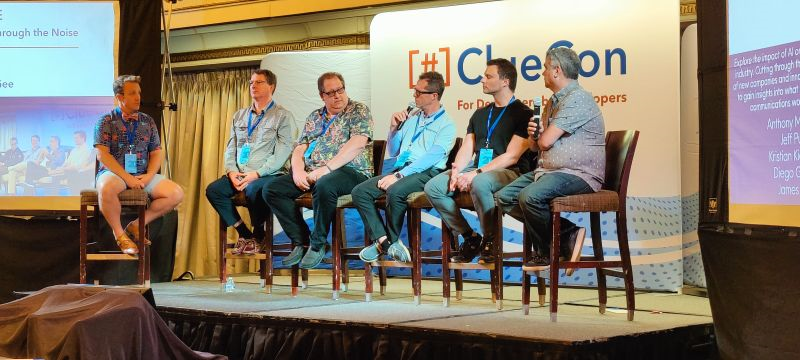This recap summarizes the 2024 AI Roundtable at ClueCon, featuring perspectives from Evan McGee and Anthony Minessale. It highlights how AI is changing search and information retrieval, the tradeoffs between specialized and general-purpose models, and the ways AI may automate routine communication tasks. It also covers the future of voice technology, including voice preservation and voice cloning, plus the security and ethical concerns that come with synthetic media and the need for safeguards like authentication and watermarking.
From the archive: this event has passed. To learn more about the upcoming conference, visit the ClueCon website.
At ClueCon 2024, we gathered a panel of experts to discuss transformative shifts that are reshaping how we interact with voice and AI. From personal relationships to business applications, the integration of AI into our communication systems is ushering in a new era of possibilities.
The insights shared by these industry experts highlight both the exciting possibilities and the challenges that lie ahead. From preserving personal legacies through voice technology to revolutionizing information retrieval with AI-driven search tools, the future promises to reshape our interactions in profound ways.
This roundtable was hosted by Evan McGee and featured James Tagg, Jeff Pulver, Diego Gosmar, Kristian Kielhofner, and Anthony Minessale. Here's a recap of the insights and future directions discussed by the panel:
AI in search and information retrieval
The panel explored how AI is revolutionizing information retrieval, which includes some of the most widely available and popular AI tools. James shared his personal shift from traditional search engines to using AI models like ChatGPT and Claude for scientific research and complex queries. His experience reflects a broader trend where AI-driven tools are outperforming traditional search engines by understanding and processing natural language more effectively.
Google’s dominance in search has long dictated the language users must adopt to retrieve information. However, with the advent of AI models capable of understanding and processing natural language, users can now interact with search engines in a more conversational manner. This shift is exemplified by tools that allow users to ask questions in their native language, enhancing accessibility and efficiency in information retrieval.
The role of specialized and general AI models
The discussion also touched upon the differences between specialized and general AI models. Diego expressed enthusiasm for highly specific, fine-tuned AI models tailored for particular business needs. These models, capable of handling complex tasks and interoperating with other specialized models, offer significant performance advantages for industry-specific applications.
Anthony brought up the continued relevance of general-purpose models. With advancements in AI, such as increased token limits, general models can handle vast amounts of information and provide versatile solutions across different contexts. This approach aligns with the growing capability of AI to manage extensive knowledge bases and adapt to various user needs without requiring overly specialized training.
AI’s impact on communication efficiency
Jeff envisions a future where AI significantly enhances communication efficiency. He suggested that AI could automate mundane tasks, such as gift shopping or filling out repetitive forms, allowing users to focus on more meaningful interactions. This vision extends to the potential for AI to facilitate more effective business communications and personal interactions by automating routine tasks to improve efficiency (something we at SignalWire talk about frequently by using AI agents in place of IVRs).
The future of voice technology
One of the predictions presented was the potential for voice technology to bridge generational gaps. Jeff highlighted an intriguing possibility: a future where your great-great-grandchildren could hear bedtime stories read in your voice. This vision creates a legacy through technology.
Advanced voice cloning technologies allow you to expand your digital footprint and preserve personal voices for future generations, allowing them to experience a piece of our personal history and emotional presence.
This idea underscores a broader trend in digital preservation and personalization. The ability to authenticate and give permission for specific uses of one’s voice represents a new frontier in digital legacy management. As Jeff pointed out, we are moving away from a time when only the famous or infamous were remembered. Now, through digital breadcrumbs—videos, tweets, and status updates—we can curate our personal legacies in ways previously unimaginable.
Ethical and security concerns
With these advancements come critical concerns about security and ethics, especially in relation to voice cloning. A question from the audience highlighted the risks of AI-generated voice clones being used for malicious purposes, such as impersonating individuals to commit fraud. Kristian emphasized the need for heightened societal awareness and education to protect vulnerable individuals from such scams.
On the technical side, Anthony highlighted the use of digital watermarks in audio and video recordings to combat misuse. These watermarks could embed invisible patterns in the media, providing a means to verify authenticity and track misuse.
Conclusion
As the panel concluded, the consensus was clear: we are witnessing a revolutionary shift in how we use voice and AI technologies. While challenges remain—particularly in security and ethical considerations—the ongoing innovations in AI and voice technology promise to redefine our interactions with the digital world.
While the advancements are promising, they also come with critical responsibilities. Addressing ethical concerns, ensuring security, and maintaining a focus on user privacy will be essential as we integrate these technologies into our lives and businesses. Staying informed and engaged with these developments will be key to leveraging their full potential while mitigating risks. The ongoing dialogue and innovation in this space will undoubtedly continue to drive transformative changes, shaping the future of communication and beyond.
If you’re interested in the topic of AI in telecom, you can expect more discussions like this at the next ClueCon—the annual developers conference hosted by the team behind the FreeSWITCH open-source project. Subscribe to the FreeSWITCH newsletter so you don’t miss any deals on tickets for the 2025 conference (save the date for August 4th-7th)!



